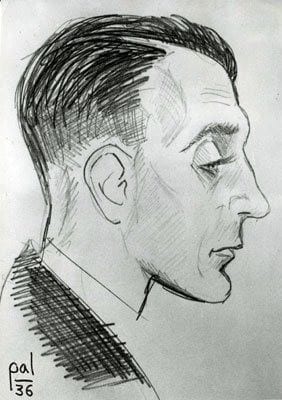Otto Rahn in Jones' Celtic Encyclopedia

b. February 18, 1904; Michelstadt, Germany.
d. March 13, 1939; Tyrolean Mts.
Poet, mystic, and Nazi researcher. Rahn was obsessed with two ideas--the Holy Grail and the Cathars, medieval French heretics; while in college, he had intended to write a dissertation on the hypothetical Kyot, the supposed troubador who gave Wolfram von Eschenbach the story of Parzival.
In 1929, he made a special trip to the Languedoc region of Southern France, a hotbed of Catharist activities in the thirteenth century. He began excavating at Montsegur, the last Cathar stronghold to fall to the Inquisition. Legend had it that the Cathars had a great treasure which was never found, but hidden deep in the mountainside. Rahn was convinced that this treasure was the Holy Grail, and he intended to find it.
Rahn's research resulted in a book called Kreuzzug gegen den Gral ("Crusade Against the Grail"), published in 1933. Rahn believed that the Cathars were in fact descended of druids who converted to Manichaeism, and that is why they were guardians of the grail--both as descendants of a Celtic priesthood, and pure followers of Lucifer, the angel who brought knowledge to mankind and exposed the Demiurge--all very gnostic. He then proceeded to identify Montsegur with Parzival's "Munsalvaesche" (Mountain of Salvation, Wagner's "Monsalvat"), and tied the Cathars with those other famous heretics, the Knights Templar, who were said to guard the grail in Parzival. (As for Eschenbach's heretical influences in his work, that is for another node.)
All of which brought him to the attention of occult-nut Heinrich Himmler, head of the SS. Himmler was obsessed with the occult, and had a particular interest in the grail. His castle at Wewelsburg was intended as an SS Camelot/Avalon, where the honorable deads' ashes would sit in twelve urns on stone pillars around a center, where the grail would sit. He also had a Round Table commissioned. Himmler invited Rahn to join the Ahnenerbe--the heritage buearu--as a civilian; Rahn latter joined officially in 1936, with the rank of SS-Unterscharfuhrer. In 1937, he wrote a second book--Luzifers Hofgesind ("Lucifer's Courtiers"), based upon his Catharist research, and a trip made to Iceland to study the Eddas.
However, in 1937 he fell into disgrace, possibly for disciplinary reasons, though it is not clear. He was sent on duty at an SS camp in Dachau; in 1938, he requested dismissal from the SS. According to personal papers, he was against the coming war, and spoke opennly against it; this may have been the reason for his relocation to Dachau in the first place. More likely, though, were rumors of homosexuality, which of course was verboten.
Not long afterwards, Rahn was found dead, frozen on a mountainside. It is generally thought to have been a suicide, though conspiracy theorists believe he was murdered by the SS in order to silence him about the secrets of the grail.
As a side note, there is a rumor that Rahn found the grail and brought it to Wewelsburg, where it stayed until the end of the war. Others say that no grail made it, but that a large quartz crystal was found instead. It is worth pointing out that Parzival describes the grail not as a cup, but as a stone, though in this case an emerald.
Otto Rahn has become a rallying point with certain occultists, neo-Cathars, and mystics, particularly those who follow the Holy Blood, Holy Grail/Priory of Sion hoax. None of his works have been translated into English, unfortunately, but they did have an influence on Trever Ravenscroft and his book Spear of Destiny.
SOURCES:
Haus, Dietrich Eckart. "Otto Rahn Reads in Dortmund Evening Lecture." Westfalia Landeszeitung, January 9, 1938.
Hitler's Search for the Holy Grail. dir. Kevin Sim. Channel 4, 1990. First aired in Britain (BBC) August, 1999. First aired in U.S. (PBS) November 2000.
O'Shea, Stephen. The Perfect Heresy: The Revolutionary Life and Death of the Medieval Cathars. NY: Walker & Co., 2001.
Sabeheddin, M. "Otto Rahn and the Quest for the Holy Grail." New Dawn. No. 43 July-August 1997.
- Vous devez vous identifier ou créer un compte pour écrire des commentaires
Termes similaires
|
(English)
|
(English)
|
(Deutsch)
|
(Español)
|
|
(English)
|
(English)
|
(English)
|
(English)
|








Commentaires récents
il y a 13 années 47 semaines
il y a 13 années 47 semaines
il y a 13 années 47 semaines
il y a 13 années 48 semaines
il y a 13 années 51 semaines
il y a 14 années 4 semaines